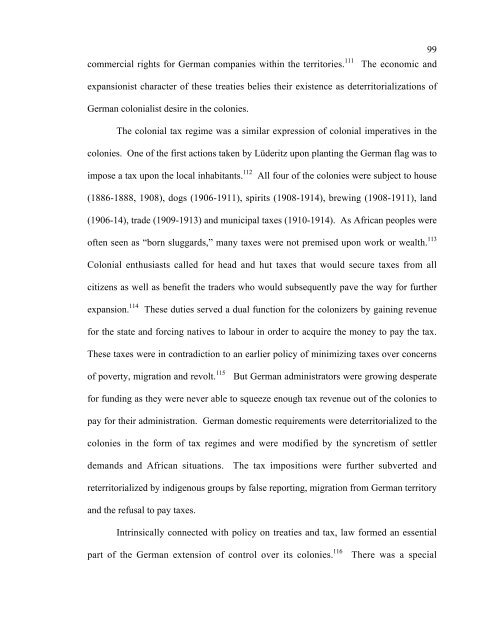A Deterritorialized History: Investigating German Colonialism ...
A Deterritorialized History: Investigating German Colonialism ...
A Deterritorialized History: Investigating German Colonialism ...
You also want an ePaper? Increase the reach of your titles
YUMPU automatically turns print PDFs into web optimized ePapers that Google loves.
commercial rights for <strong>German</strong> companies within the territories. 111 The economic and<br />
expansionist character of these treaties belies their existence as deterritorializations of<br />
<strong>German</strong> colonialist desire in the colonies.<br />
The colonial tax regime was a similar expression of colonial imperatives in the<br />
colonies. One of the first actions taken by Lüderitz upon planting the <strong>German</strong> flag was to<br />
impose a tax upon the local inhabitants. 112 All four of the colonies were subject to house<br />
(1886-1888, 1908), dogs (1906-1911), spirits (1908-1914), brewing (1908-1911), land<br />
(1906-14), trade (1909-1913) and municipal taxes (1910-1914). As African peoples were<br />
often seen as “born sluggards,” many taxes were not premised upon work or wealth. 113<br />
Colonial enthusiasts called for head and hut taxes that would secure taxes from all<br />
citizens as well as benefit the traders who would subsequently pave the way for further<br />
expansion. 114 These duties served a dual function for the colonizers by gaining revenue<br />
for the state and forcing natives to labour in order to acquire the money to pay the tax.<br />
These taxes were in contradiction to an earlier policy of minimizing taxes over concerns<br />
of poverty, migration and revolt. 115 But <strong>German</strong> administrators were growing desperate<br />
for funding as they were never able to squeeze enough tax revenue out of the colonies to<br />
pay for their administration. <strong>German</strong> domestic requirements were deterritorialized to the<br />
colonies in the form of tax regimes and were modified by the syncretism of settler<br />
demands and African situations. The tax impositions were further subverted and<br />
reterritorialized by indigenous groups by false reporting, migration from <strong>German</strong> territory<br />
and the refusal to pay taxes.<br />
Intrinsically connected with policy on treaties and tax, law formed an essential<br />
part of the <strong>German</strong> extension of control over its colonies. 116 There was a special<br />
99
















